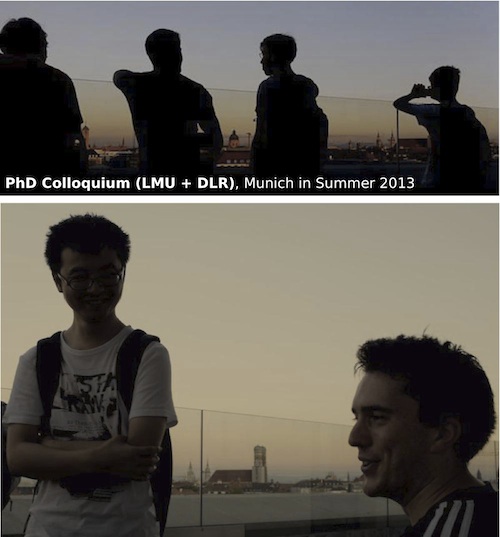| Home | Research | Projects | Teaching |

Interests: clouds from droplet to planetary scale, geophysical fluid dynamics from wind turbine wakes to equatorial waves, geophysical turbulence from tree canopy flow to macro-turbulence in general circulation models, numerical model development from laboratory scale large-eddy simulations to planetary spheres, stochastic partial differential equations, dynamical systems, assimilation of cloud-affected radiances in deep convection
|
Destination Earth (DestinE, EU) |
| In 2022 a European project began at ECMWF: Destination Earth (DestinE). The goal is to resolve Earth System processes in greated detail, in order to support policy making. One big step forward is to create a Digital Twin of our Earth System. This is a team effort of more than 50 scientists with diverse backgrounds in different fields from machine learning, data assimilation, turbulence, high performance computing supported by a communications & administrations team. |
|
Self-aggregation in tropical convection (ISF) |
| In a joint project between Tel Aviv University and the Indian Institute of Science, we study the self-aggregation from meso-scale to planetary scale in idealized simulations. Representing unresolved scales with a stochastic forcing in a moist environment may lead to the formation of equatorial waves that travel around the globe, like the MJO - one popular wave mode in the tropics. |
|
Satellite data-assimilation (HErZ, BMVI) |
|
Situated at Ludwig-Maximilans Universität this data-assimilation group
investigates, e.g., the impact of satellite observations on the prediction
of convective-scale weather patterns. The importance of conective clouds on
forecasting of severe weather and in climate monitoring motivates the research.
|
| Wind Energy in Complex Terrain (BMU, BMWi) |
|
In Nov. 2013 our institute began to work on the wind energy project LIPS,
funded by the
Bundesumweltministerium (BMU) from 2013 until 2016. We study the wind field
around wind mills in complex terrain.
|
| Multiscale Canopy Flow (DFG, BMBF) |
|
This year we published an article in Theoretical and Computational Fluid Dynamics
as part of the DFG project 'Multpiple
Scales in Fluid Mechanics and Meteorology'. Simulations on the 'German Climate Computing Center'
are funded by BMBF in 2014.
|